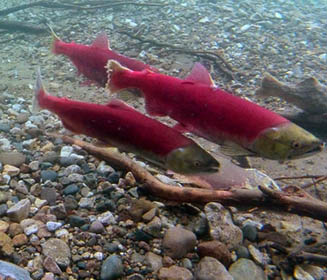Description:
The identify sockeye salmon refers to “Suk-kegh,” that means “red-fish” within the native Halkomelem language of Alaskan inhabitants.
Sockeye includes a fusiform, streamlined, laterally compressed physique enabling long-distance marine migration and upstream run.
Sea-going sockeye are darkish metal blue to greenish-blue on the highest (giving them their “blueback” identify), iridescent silvery sides, and white stomach. Some people could exhibit darkish speckling and irregular marks on the dorsal fin.
As sockeye returns to their freshwater spawning grounds, their heads flip olive inexperienced, and their our bodies flip shiny purple, therefore their identify, “purple” salmon.
Male sockeye develops a humped again and hooked jaws full of tiny, seen tooth.
Common size 18 in. and weigh 5–15 lb. Lifespan is about 4-5 years.
Kokanee salmon
Some sockeyes don’t migrate to the ocean and reside their whole lives in freshwater lakes. These landlocked sockeyes are referred to as the Kokanee within the native Salish language. They’re much smaller in dimension and measure about 10-12 In.
Biology
Sockeye salmon are anadromous fish. Within the spring, fry emerge from the nest, and go to the ocean throughout their first summer season earlier than migrating to the ocean. They develop rapidly in dimension and return as adults to natal streams to spawn in the summertime.
Simply earlier than spawning, the feminine selects an appropriate floor, often with a gravel backside, and digs a nest with its tail.
The feminine is then attended by a dominant male and typically a number of subordinate males.
All grownup sockeye die after spawning.
Habitat
Sockeye is the smallest of Pacific salmons. In a method just like different salmon species. They’re migratory fish finishing their fascinating journey from natal freshwater streams, rivers, lakes, and deep ocean waters and again once more to their natal waters to spawn and die.
Sockeye habitat requires chilly, clear, oxygenated water to outlive as heat ocean temperatures enhance the power expenditure in the course of the migration and produce fewer eggs on the spawning grounds.
Fry feed totally on zooplankton, fish larvae, and bugs, whereas adults largely rely upon marine zooplankton, krill, bugs, and small crustaceans.


